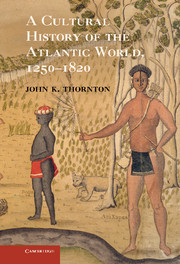Part III - The Nature of Encounter and its Aftermath
Published online by Cambridge University Press: 05 November 2012
Summary
The Nature of Encounter and its Aftermath
Three processes brought about three different sorts of cultural mixtures, which in turn moderated the contact of cultures in the Atlantic. These three processes were conquest, colonization, and contact. Which process developed where was very much dependent on the nature of the Atlantic societies in contact, and particularly the non-European partner to the interaction.
Conquest appears straightforward, although upon close examination it is not nearly as uncomplicated as it appears. Conquest takes place when there is a switch in sovereignty between states, so that, for example, Native American or African states surrender to a European invader. For conquest to take place, at the very least there has to be a state in existence, some person or authorized group has to have the authority to surrender and to make that declaration valid for their subjects for it to have any real force. Conquest took place largely under Spanish auspices in the Americas; in Africa, only Angola was conquered y the Portuguese and Spanish. Once conquest took place, the organization of the state was used by the conquerors to govern the population, at least initially. Only after many years might new institutions and changed circumstances alter the situation to the degree that the preexisting state apparatus was effectively replaced by something new, and in many cases the older status system survived for centuries.
- Type
- Chapter
- Information
- A Cultural History of the Atlantic World, 1250–1820 , pp. 157 - 158Publisher: Cambridge University PressPrint publication year: 2012



